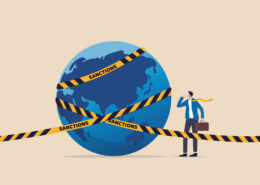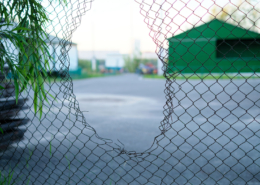Sanctions and Export Controls Update
Monthly Roundup – July 2025
📅 August 4, 2025
📅 August 4, 2025
Welcome to this month’s Sanctions and Export Controls Update, highlighting IFI’s take on key developments from July 2025.
The EU adopted its sweeping 18th Russia sanctions package, issuing broad-ranging sanctions and export controls across various sectors, lowering the oil price cap, and targeting persons in third countries. The EU also enacted its 4th Sudan sanctions package to bring a peaceful resolution to the conflict. Meanwhile, the UK launched the world’s first sanctions program aimed at dismantling people smuggling networks, reached its largest-ever sanctions violation settlement, and imposed additional sanctions on Russian persons contributing to the war against Ukraine.
The United States lifted hundreds of Syria-related sanctions to facilitate its re-entry into the global economy, issued its largest Iran-related sanctions package since 2018, and targeted two Venezuelan criminal organizations. The Departments of Commerce and Justice also entered a $140 million settlement with Cadence Design Systems for its illegal export of semiconductor design tools and technology to a PRC military university.
The EU adopted its 18th sanctions package against Russia, expanding measures across the energy, banking, and military sectors, while also targeting entities in third countries. The EU lowered the price cap for Russian crude oil from USD 60 to USD 47.6 per barrel and introduced an automatic adjustment mechanism to maintain its effectiveness. The package also includes sanctions on 105 shadow fleet vessels and firms responsible for managing them. The bloc banned the import of refined petroleum products made from Russian crude oil from any third country, sanctioned an Indian refinery majority-owned by Rosneft, and imposed a full transaction ban on the Nord Stream 1 and 2 pipelines.
In the financial sector, 22 Russian banks were banned from accessing EU-based specialized financial messaging services. The EU also lowered the threshold for sanctioning third-country financial and credit institutions, as well as virtual asset service providers, that are linked to Russia’s System for Transfer of Financial Messages (SPFS), assist in evading EU sanctions, or support Russia’s war of aggression against Ukraine. Persons located in third countries that circumvent oil-related restrictions are now also subject to further transaction bans. The Russian Direct Investment Fund (RDIF) and its sub-funds and companies, which provide Russia access to global financial markets and foreign currency exchange, was also sanctioned.
Suppliers of the Russian military industrial complex, including three entities based in China and eight entities based in Belarus, were sanctioned in the package. Tighter export restrictions concerning dual-use goods and technologies were imposed on 26 new entities in Russia, China, Hong Kong, and Türkiye that have been involved in circumventing restrictions. The package also imposed a full transaction ban and an embargo on imports of arms from Belarus, and designates individuals involved in Russia’s “military education” of Ukrainian children, manipulating Ukrainian cultural heritage, and disseminating Russian propaganda.
The EU enacted its fourth sanctions package related to the conflict in Sudan. Restrictive measures were imposed on Alkhaleej Bank, which finances the Rapid Support Forces (RSF) and is largely owned by companies linked to family members of RSF Commander Mohamed Hamdan Dagalo, and Red Rock Mining Company, involved in facilitating the production of weapons and vehicles for the Sudanese Armed Forces (SAF). The EU also sanctioned military commanders of the SAF and RSF for their leading roles in ethnic violence and other mass atrocities. The EU’s actions underlined its commitment to achieving a peaceful resolution to the Sudanese conflict and addressing the humanitarian crisis in the country.
The UK’s HM Revenue and Customs (HMRC) has secured its largest-ever settlement for a sanctions violation, collecting GBP 1.2 million (USD 1.6 million) from an exporter who unlawfully supplied goods to Russia. This penalty, paid in May, follows a breach of export controls introduced after Russia’s invasion of Ukraine. As part of coordinated international efforts, the UK and its partners have imposed sanctions that have cut off approximately $450 billion in war funding to Russia. HMRC urged businesses with global operations to adhere to export controls and seek official guidance to prevent similar penalties.
The UK sanctioned three units of the Russian military intelligence agency (GRU) and 18 military intelligence officers responsible for conducting a campaign of malicious cyber activity, including in the UK. Among the designated individuals and entities were officers responsible for infecting the device of the daughter of a Russian double agent, and Unit 26165 of the GRU for its role in conducting online reconnaissance to assist in identifying airstrike targets in Ukraine, like the Mariupol Theatre which killed hundreds of civilians.
The UK imposed sanctions on 135 oil tankers and two entities supporting Russia’s shadow fleet operations and energy and oil sectors. Intershipping Services LLC and Litasco Middle East DMCC were sanctioned for their roles in registering shadow fleet vessels under the Gabonese flag and transporting Russian oil on shadow fleet vessels, respectively. The designated vessels transported up to $10 billion worth of goods annually for the Russian state. The UK also lowered the oil price cap in coordination with the EU to restrict the flow of energy revenues to Russia.
The Foreign, Commonwealth & Development Office (FCDO) established the world’s first framework to sanction persons complicit in facilitating people smuggling to the UK. Under the new sanctions regime, the FCDO will target gangs involved in driving irregular migration to the UK, as well as financiers, companies involved in the sale of small boat equipment and fraudulent passports, and other enablers. Those sanctioned under the new program will be subject to an asset freeze and travel ban. The sanctions framework is a key component of the FCDO’s ‘disrupt, deter, return’ strategy to address irregular migration globally.
The FCDO’s first sanctions package under the new regime targeted 25 persons, including Iraqi and Turkish middlemen facilitating illicit hawala payments, organized crime leaders in Belgium, Serbia, and elsewhere, and a Chinese entity supplying small boats explicitly for the purpose of people-smuggling. The FCDO coordinated with the National Crime Agency to develop its cases and work in concert with law enforcement authorities.
On July 1, 2025, the U.S. Treasury’s Office of Foreign Assets Control (OFAC) implemented President Trump’s Executive Order revoking broad sanctions on Syria, supporting the country’s transition under its new government. As part of the shift, OFAC removed 518 individuals and entities from the SDN List, unblocking assets tied to Syria’s development and reconstruction. However, sanctions remain on Bashar al-Assad, his associates, and others tied to terrorism, human rights abuses, or drug trafficking. OFAC also designated 139 individuals and entities under amended authorities to ensure continued accountability for past regime-linked actions and regional destabilizers, while facilitating Syria’s re-entry into global commerce.
U.S. Secretary of State Marco Rubio announced that President Trump will be revoking the foreign terrorist organization (FTO) designation of al-Nusrah Front, also known as Hay’at Tahrir al-Sham (HTS), under the Immigration and Nationality Act, effective July 8. The move is in line with President Trump’s pledge to lift sanctions on Syria. The action follows the announced dissolution of HTS and the Syrian government’s commitment to counter terrorism in all its forms, and recognizes the positive actions taken by Syrian President Ahmed al-Sharaa.
OFAC sanctioned several entities involved in the illicit transportation and sale of Iranian oil, with a focus on networks that have been smuggling oil disguised as Iraqi oil. This includes a network controlled by Iraqi businessman Salim Ahmed Said, whose companies blend Iranian oil with Iraqi oil to bypass sanctions, using ship-to-ship transfers and fake documentation. Said’s operations also involve bribing Iraqi officials to facilitate these sales. The sanctions also target vessels and shipping companies involved in these activities, including those used by Iran’s shadow fleet. OFAC’s actions aim to disrupt Iran’s access to the financial resources fueling its destabilizing activities, while increasing pressure on the Iranian regime’s oil trade. Additionally, sanctions have been imposed on companies involved with the IRGC-QF, a key player in Iran’s oil smuggling operations, including its use of vessels to transport Iranian oil under false pretenses.
OFAC sanctioned 22 entities across Hong Kong, the UAE, and Türkiye for their involvement in facilitating the sale of Iranian oil that funds the Islamic Revolutionary Guard Corps-Qods Force (IRGC-QF), a designated Foreign Terrorist Organization. These entities, including front companies, were used to bypass sanctions by transferring funds to the IRGC-QF through offshore accounts. The proceeds from these oil sales support Iran’s weapons programs and terrorist activities in the Middle East. OFAC’s action is part of a broader effort to disrupt Iran’s shadow banking system and prevent its destabilizing actions. The sanctions, issued under Executive Order 13224, target both the companies involved in these illicit transactions and those directly controlled by the IRGC.
In its largest Iran-related sanctions package since 2018, the U.S. Department of the Treasury targeted the illicit oil shipping and money laundering networks of Mohammad Hossein Shamkhani, the son of a top political advisor to the Supreme Leader of Iran. Shamkhani used his father’s political influence to raise tens of billions of dollars primarily through the export of Iranian and Russian oil, most often to customers in China. The networks were supported by a fleet of vessels, ship management firms, front companies, and accomplices around the world, and ultimately benefitted the Iranian regime and Shamkhani personally. Over 115 persons across 20 jurisdictions were sanctioned in Treasury’s action.
OFAC designated the leader of Tren de Aragua and five other key members as Specially Designated Global Terrorists. The individuals are responsible for organizing illegal mining operations, sourcing military-grade weapons for the group, the murder of Venezuelan officials, narcotics and human trafficking, and money laundering, among other activities. Treasury’s targeted sanctions were the result of U.S interagency coordination, including with the Department of Justice’s Joint Task Force Vulcan. Tren de Aragua, a Venezuelan transnational criminal organization, was designated as a Foreign Terrorist Organization by the Trump administration in February 2025.
OFAC sanctioned the Cartel de los Soles, a Venezuelan organization headed by President Nicolas Maduro Moros and members of his regime, as a Specially Designated Global Terrorist. The Cartel de los Soles provided material support to Tren de Aragua and the Sinaloa Cartel, both of which are involved in narcotics trafficking, human smuggling and trafficking, money laundering, and other criminal activities, and have been designated as Foreign Terrorist Organizations by the Department of State. Treasury’s action highlights the Maduro regime’s sponsorship of narco-terrorism and underscores the United States’ commitment to dismantle cartels and other actors contributing to destabilizing activities.
OFAC sanctioned seven senior officials and one entity linked to Hizballah’s financial institution, Al-Qard Al-Hassan (AQAH). These individuals, who have played key roles at AQAH, facilitated the group’s evasion of U.S. sanctions, enabling Hizballah to access the formal financial system and funnel money for its operations. This action reinforces the United States’ commitment to disrupting Hizballah’s financial network and supporting efforts by the Lebanese government to limit the group’s influence. Treasury’s move targets AQAH officials who have long been involved in hiding Hizballah’s financial transactions and furthering its agenda, undermining Lebanon’s economy and exposing banks to money laundering risks.
The U.S. has significantly rolled back permissions for exporting liquefied petroleum gas (LPG) to Venezuela, based on a revised general license from OFAC. Under the updated sanctions, LPG can only be offloaded if it was loaded onto a vessel by July 7 and arrives in Venezuela by September 5. The new rules also ban payment-in-kind involving petroleum or related products and prohibit any dealings with blocked individuals or entities except for Petróleos de Venezuela (PDVSA) and select government-affiliated organizations. This update, outlined in General License No. 40D effective July 7, replaces the earlier License 40C issued in 2024.
The Department of State imposed visa restrictions on officials of the Cuban government and prison personnel involved in human rights violations related to the detention and torture of demonstrators in the July 2021 protests. Eleven regime-linked properties were also added to the Cuba Restricted List and Cuba Prohibited Accommodations List to restrict the government’s access to U.S. financial resources. The sanctions are the first to be issued in-line with National Security Presidential Memorandum-5, published on June 30, 2025, which sets forth the Trump administration’s policy approach toward Cuba.
Bahram Mohammad Ostovari, an Iranian national and U.S. lawful permanent resident, was indicted on four charges for allegedly exporting electronics used in railway signaling and telecommunications systems from the United States to Iran by way of the UAE. Ostovari controlled a Tehran-based engineering company that supplied Iran and its government with sophisticated computer processors and other electronic components, allegedly routing the goods through two front companies he controlled in the UAE without acquiring a license from U.S. authorities. The Departments of Homeland Security and Commerce are investigating the case, and if convicted, Ostovari faces a maximum penalty of 20 years in prison for each count.
Cadance Design Systems pleaded guilty to violating export controls related to its sale of electronic design automation (EDA) hardware, software, and semiconductor design intellectual property technology to the National University of Defense Technology (NUDT) of China. Between February 2015 and April 2021, Cadence and its Chinese subsidiary conspired to transfer EDA tools subject to the Export Administration Regulations to NUDT, which was placed on the Entity List in 2015 for its use of U.S.-origin components in supporting nuclear explosive simulation and military simulation activities for the PRC’s Central Military Commission. Candence admitted that its employees conspired to conceal the identity of the end user, transferred the restricted items to NUDT, and installed hardware on its campuses. The company agreed to pay over $140 million in civil and criminal penalties for its violations.










 Training for the Wrong Risk
Training for the Wrong RiskThis site uses cookies. By continuing to browse the site, you are agreeing to our use of cookies.
Accept settingsHide notification onlySettingsWe may request cookies to be set on your device. We use cookies to let us know when you visit our websites, how you interact with us, to enrich your user experience, and to customize your relationship with our website.
Click on the different category headings to find out more. You can also change some of your preferences. Note that blocking some types of cookies may impact your experience on our websites and the services we are able to offer.
These cookies are strictly necessary to provide you with services available through our website and to use some of its features.
Because these cookies are strictly necessary to deliver the website, refusing them will have impact how our site functions. You always can block or delete cookies by changing your browser settings and force blocking all cookies on this website. But this will always prompt you to accept/refuse cookies when revisiting our site.
We fully respect if you want to refuse cookies but to avoid asking you again and again kindly allow us to store a cookie for that. You are free to opt out any time or opt in for other cookies to get a better experience. If you refuse cookies we will remove all set cookies in our domain.
We provide you with a list of stored cookies on your computer in our domain so you can check what we stored. Due to security reasons we are not able to show or modify cookies from other domains. You can check these in your browser security settings.
These cookies collect information that is used either in aggregate form to help us understand how our website is being used or how effective our marketing campaigns are, or to help us customize our website and application for you in order to enhance your experience.
If you do not want that we track your visit to our site you can disable tracking in your browser here:
We also use different external services like Google Webfonts, Google Maps, and external Video providers. Since these providers may collect personal data like your IP address we allow you to block them here. Please be aware that this might heavily reduce the functionality and appearance of our site. Changes will take effect once you reload the page.
Google Webfont Settings:
Google Map Settings:
Google reCaptcha Settings:
Vimeo and Youtube video embeds:
You can read about our cookies and privacy settings in detail on our Privacy Policy Page.
Privacy Policy